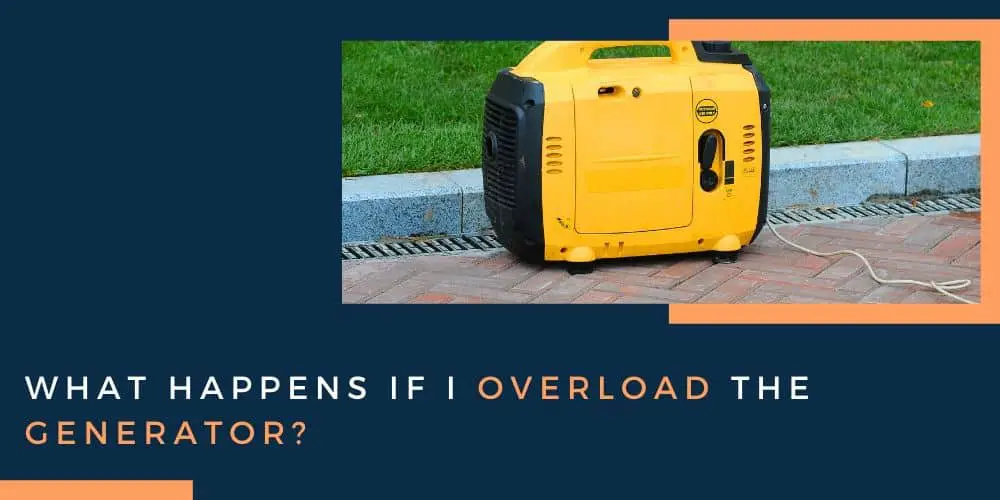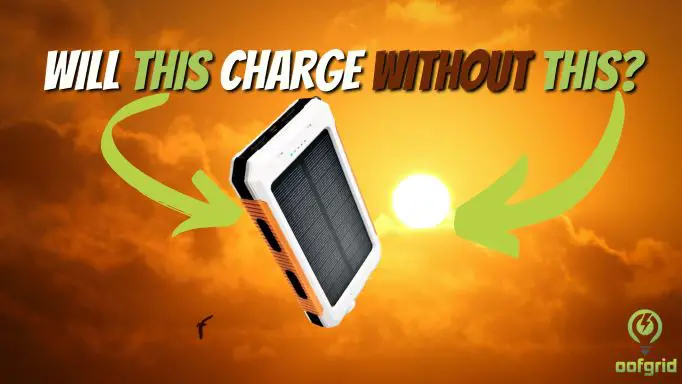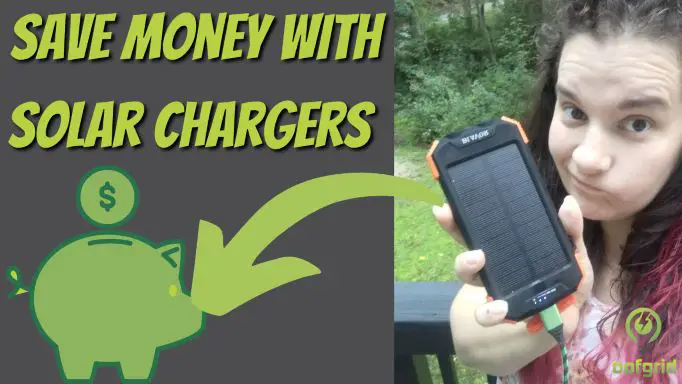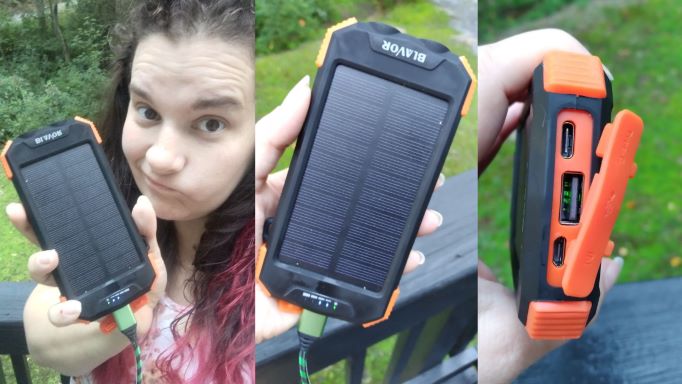A generator with a gasoline engine converts mechanical power to electrical power. With an inverter generator, the engine will try to keep up with the electrical power demand by running faster. There is a point with all generators, where they cannot run fast enough to keep up with the power draw.
This can result in a power overload that can not only damage your portable generator but also be dangerous.
Let’s take a look at some of the important points to consider when tackling the question: What Happens If I Overload the Generator?
Contents
Starting Watts
Most generators will specify two main power statistics. The first is the starting watts or the peak watts, the second the running watts.
Peak Watts
Often, the highlighted number on the model name. Peak watts are the limit at which the generator can power.
Electric saws, televisions, and more so appliances with compressors such as fridges – all use a higher level of power when they are first turned on. If a generator did not this buffer, it would shut down even if the running watts were well beneath its capacity.
Best RV & Camper Generator Review here!

Running Watts
If the generator ran at the peak output all the time, it would either overheat or shut off when anyone device surged. Running watts is what you need to calculate when investigating which generator to buy.
Brownout
You may have heard of a brownout before – common during the summer. Brownouts happen when power-stations can fail to meet the demand. Demand spikes in heatwaves when everyone is using air-conditioning and fridges are running all the time.
Lights will dim, some electronics will stop working
To cope, the authorities will reduce the power to the grid to prevent the generators from shutting down and causing a full blackout.
A private generator will save itself in the same way – avoiding shutting down, but not making any more power. The lights will dim, some electronics will stop working, and there is the potential for damaging sensitive electronics.
See the Best Budget Generators here!
What Happens if I Overload the Generator?
A few things can happen if you overload the generator, you can overheat the engine or the stator, or you can trip the fuse.
Engine Overheating
Newer generators have overheating protection. Protection such as heat sensors and fans to keep their temperatures constant in hot weather. Older generators with try to keep up with demand and can end up overheating the engine.
If in doubt, turn it off
An air-cooled engine overheating is not as obvious as with a water-cooled engine. You may smell burning oil, and the engine will sound like it is struggling. If in doubt, turn it off, and inspect the oil in the engine.
Wait for at least a half-hour and unplug all appliances before attempting to restart the engine. If the engine starts with ease and sounds normal, plug in one appliance at a time to see if it is a loading issue.
Stators
If the engine is the brain, then the stator is the heart, forcing electricity around your appliances. And if the engine overheats, it will often overheat the stator at the same time. And unlike an engine, when they fail, stators are difficult to repair.
Restart it without any load
Most modern generators will have sensors and breakers to prevent this situation. They also have overload, oil, and output alarms and lights to make it more obvious.
A simple remedy is to turn off the engine, if it has not already done so, and wait. When the generator has cooled, restart it without any load, and plug one appliance in at a time. A dead stator will render the generator useless, most other parts are easy to replace, so you want to look after it.
Fuse
Even a small generator will have a fuse to protect the equipment and the user from shorts and overloads. Modern generators will have trip switches, which pop out if the machine overloads.
Check to see if any of the overload lights are lit
There are often several breakers, one for the main generator circuit, and more for the outlets. This is an important safety feature for 20 and 30-amp RV sockets, which will have long cables running through wet ground.
In most cases, even if the main switch trips, the engine will continue to run. Unplug all the devices, and check to see if any of the overload lights are lit. If the warning lights are clear, you can push the fuse in to reactivate the circuit after 10 seconds. Then you can plug one appliance in at a time to assess where the issue is.
GFCI
A GFCI is necessary if you are using high currents to power an RV, in wet sites or when there is a chance the cable will get wet. If you have a generator with a GFCI, then this is going to be more sensitive to overloads.
The idea is that if there are any short-circuits, the GFCI is more sensitive, and the power cuts much faster. A short will travel through to the ground rather than electrifying your RV. If the GFCI trips, turn off the engine and examine the cable and sockets for damage.
See the Quietest Generators Available here!

How to Avoid Overloads in the Future
The simplest solution to an overload – is prevention and buying a generator that is big enough for your needs.
Add the Watts
Start by adding up all the power your devices will draw, look at both the running power and the peak power. Then you need to consider how you are going to power these appliances. Then when you choose your generator, make sure that it will cope with both the total peak and running watts of your appliances.
Maintenance Checklist
- Always check the engine oil before you start the generator to prevent overheating.
- Make sure that there are no obstructions or dirt in the cooling vents or fans.
- Inspect the cables and try to avoid laying them in water.
- Take more care when plugging in high-demand appliances such as cookers, fridges, and air conditioners.
Fuse Protection
Most people will run a dedicated power line to their RV’s TT-30R socket, and the RV will manage the overloads. If you are running appliances straight from a generator, it is worth investing in a GFCI extension cord. A GFCI protects both the appliances and the generator from overloads and short-circuits.
Here is Wattage Guide
| Appliances | Running Watts | Start Up Watts |
|---|---|---|
| Clock Radio | 3 W | 5 W |
| Phone Charger | 3 W | 5 W |
| Google Nest | 5 W | 5 W |
| Tablet Computer | 10 W | 15 W |
| 32 In LED TV | 20 W | 60 W |
| Air Purifier | 25 W | 30 W |
| Humidifier | 35 W | 40 W |
| Cooling Fan | 40 W | 60 W |
| Freezer | 40 W | 60 W |
| PS4 or Xbox | 50 W | 120 W |
| Lightbulb 60 W | 60 W | 60 W |
| Water Dispenser | 100 W | 100 W |
| Refrigerator | 150 W | 300 W |
| American Style Refrigerator | 200 W | 500 W |
| Garden Strimmer | 300 W | 500 W |
| Submersible Water Pump | 350 W | 500 W |
| Music Stereo | 400 W | 400 W |
| Vacuum Cleaner | 400 W | 1000 W |
| Toaster | 700 W | 1900 W |
| Electric Drill | 800 W | 1100 W |
| Coffee Maker | 800 W | 1000 W |
| Washing Machine | 800 W | 800 W |
| Lawn Mower | 1000 W | 1500 W |
| Air Fryer | 1400 W | 1400 W |
| Air Compressor | 1500 W | 4800 W |
| Oven | 2000 W | 2000 W |
| Home Air Conditioner | 1200 W | 4000 W |
| RV Air Conditioner | 1300 W | 4500 W |
| Belt Sander | 1400 W | 2400 W |
| Hairdryer | 1400 W | 1400 W |
| Hammer Drill | 1700 W | 1600 W |
| Air Compressor – 1 HP | 1600 W | 4800 W |
| Welding Rig | 2500 W | 3000 W |
Summary: What Happens If I Overload the Generator?
If treated with respect, a generator will last a long time. You need to prevent generators from running too hot. Check the load you are putting on the machine and keep an eye out for exposed wires.
Then if you are unfortunate enough to suffer an overload, the damage will be minimal.
Disclaimer: All information in this article is given freely as guidance and you should always seek help and information from a qualified tradesman before applying anything you have read.







